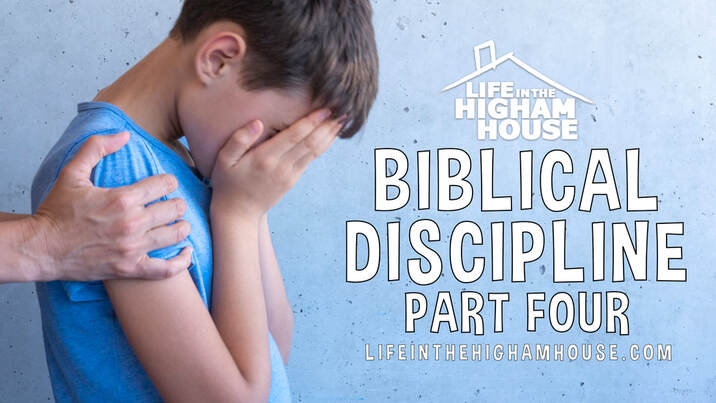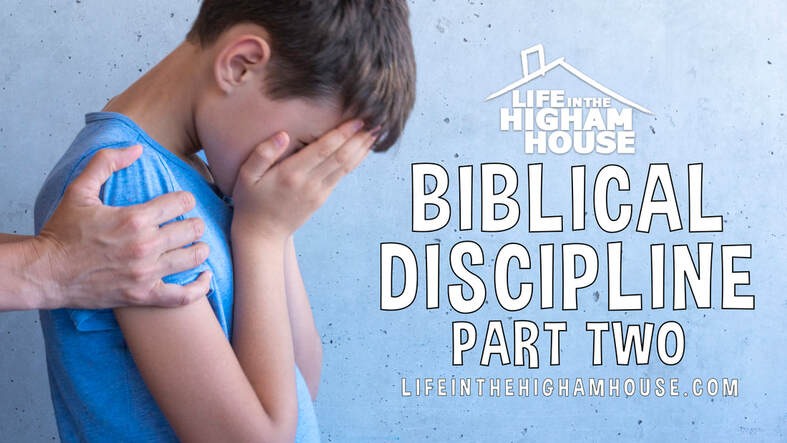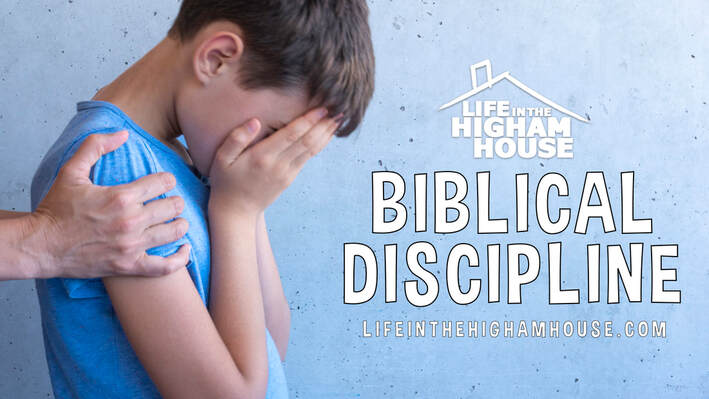|
* THIS POST CONTAINS BOTH AFFILIATE AND PRODUCT LINKS,
ALONG WITH LINKS TO THIRD PARTY WEBSITES MENTIONED IN THE POST.* - repost -
As we move forward, I want to spend a few more minutes thinking about what the Bible has to say to parents about discipline. In the introduction of this series, the second thought that I shared was the realization that the Bible needs to be the source for discipline. That if we as parents hope to discipline our children in a godly way, we must look towards the Bible as our first source of Truth and Godly wisdom. I say first, because I think there are a number of great books written by godly men and women, to and for parents to help us discipline well. Many of these books draw in biblical principles and present them as techniques to help you be a better parent. I have read and am reading books such as these and they have been helpful. But what I want to reinforce for us as parents is that to rely on just these books and never really opening up the Bible to read and learn God's word first hand is dangerous. I do not discredit the intention or the effectiveness of these books. Many are great books. But parents, you MUST be in the word of God daily; reading, studying, and allowing the Holy Spirit to teach you the vital truths that come from God.
So the first question is this, Why? Why is the Bible the best source for disciplining your children?
The Apostle Paul writes to the young pastor Timothy, “All Scripture is inspired by God and profitable for teaching, for reproof, for correction, for training in righteousness; so that the man of God may be adequate, equipped for every good work.” (2 Timothy 3:16,17 esv)
Discipline begins with teaching. If we're not teaching God's Word, what are we teaching?
As always, thanks for reading! If you liked this post or have found it to be helpful, be like it below and share it with your friends! You can also follow us on Facebook and Twitter, and our new Youtube channel that's now live! - jay and amy
0 Comments
* THIS POST CONTAINS BOTH AFFILIATE AND PRODUCT LINKS,
ALONG WITH LINKS TO THIRD PARTY WEBSITES MENTIONED IN THE POST.* - repost -
Discipline begins with instruction.
That was lesson one. To properly carry out the work of disciplining our children we must first become their teachers. As God taught Adam in the garden concerning the tree of the knowledge of good and evil, we too must instruct our children. I think one of the hardest things to do as a parent is to discipline your child. As a parent, I really don't like putting restrictions or punishment on the kids. But carrying out the discipline to it's fullest extent is super important. That means that whether you like it or not, discipline must include consequences.
Let's consider once again, our passage from Genesis 2:16 & 17.
16 And the Lord God commanded the man, saying, “You may surely eat of every tree of the garden, 17 but of the tree of the knowledge of good and evil you shall not eat, for in the day that you eat of it you shall surely die.” (Gen. 2:16-17 esv) Notice what God does here. First God gives the man the teaching, 'do eat from this particular tree.' Then he follows up with the consequence, '...for in the day that you eat of it you shall surely die.' (Harsh, right?) As we talk to our kids, one of the things I always come back to is the fact that everything we do comes with a consequence. If we do right, there are good consequences. If we do wrong, there are bad consequences. I think of what God says to Cain in Genesis 4:7, "7 If you do well, will you not be accepted? And if you do not do well, sin is crouching at the door. Its desire is for you, but you must rule over it.” (Gen. 4:7 esv) When I read this, I see God counseling Cain to consider his actions and what he is about to do. Here's a scenario. Child 'A' walks past Child 'B'. Child 'B' thinks he'll be funny and put his foot out to trip Child 'A'. After falling on his face, Child 'A' doesn't think it was so funny. Child 'A' then chooses to retaliate. Now child 'B' is crying, and both come running to you for justice.
You see, God always follows through with his children. As he teaches us the expectations he has for us, there is always the warning of what will happen if and when we disobey. And while there is always forgiveness, there is still the realities of our consequences.
As parents, we must think about discipline as both a BEFORE and an AFTER process. Before means we are teaching our kids what we expect and what will happen if there is disobedience. After means that we follow up with the said consequences. And while it may pain us to see our kids dealing with the consequences, we have to remember that they chose to be disobedient. Hopefully you consistency in loving them and being firm in your discipline will help to direct them into future obedience.
We'll talk more about Discipline and the Bible in our next post.
In the meantime, thanks for reading! If you liked this post or have found it to be helpful, be like it below and share it with your friends! You can also follow us on Facebook and Twitter, and our new Youtube channel that's now live! If you missed the earlier 2 posts, you can find them by clicking on the links below! Discipline and the Bible - Part 1 & Discipline and the Bible- Part 2. - jay and amy
* THIS POST CONTAINS BOTH AFFILIATE AND PRODUCT LINKS,
ALONG WITH LINKS TO THIRD PARTY WEBSITES MENTIONED IN THE POST.* - repost -
Questions for parents.
What does discipline look like in your home? Is it strategic or random? Do you have a plan in place for when infractions occur? Something like, 'If you do that, this will happen.' Or do you just deal with it in the moment? Something like, 'Well now you're grounded!' As I look at the Bible, I think there is process to the work of discipline. Let me share.
It starts in Genesis 2, as we read the account of man being created and placed into the Garden of Eden. Eden becomes a picture of God's rest, or of heaven; a place of perfect delight. In this garden God does something pretty amazing. In the center of the garden God plants 2 trees. The first is the Tree of Life. The second, the Tree of the Knowledge of Good and Evil. Surrounding these trees, all the splendor and delight of the garden. Man is then told that he is to work and keep the garden.
But in verses 16 and 17, of chapter 2, God says this... "16 And the Lord God commanded the man, saying, “You may surely eat of every tree of the garden, 17 but of the tree of the knowledge of good and evil you shall not eat, for in the day that you eat of it you shall surely die.” (Genesis 2:16-17 ESV) I think this is the beginning of discipline. If Discipline begins as a practice of teaching or instruction, we can say that this was God teaching or instructing the man. God gives the man clear boundaries, or rules for the garden. We could say that this was the expectations that God establishes for mans behavior while in the garden. Man was instructed that he was free to enjoy the fruit from every tree in the garden except for the Tree of the Knowledge of Good and Evil. Man knew God's requirements.
As you think about your process of discipline, ask yourself, 'Am I disciplining my children based on what I am teaching them or how they are living without my instruction?'
Maybe sit down with your spouse and begin talking about what you are teaching your kids. Are you applying instruction to their hearts in a way that reveals your expectations, or are you reacting to the infraction that you know to be wrong but didn't first taught as a boundary? Be sure to join us again tomorrow as we look at what comes out of our instruction and the choice that every one of has to make. In the meantime, thanks for reading! If you liked this post or have found it to be helpful, be like it below and share it with your friends! You can also follow us on Facebook and Twitter, and our new Youtube channel! - jay and amy
* THIS POST CONTAINS BOTH AFFILIATE AND PRODUCT LINKS,
ALONG WITH LINKS TO THIRD PARTY WEBSITES MENTIONED IN THE POST.* - repost -
Raising kids is serious business. As parents, none of us should take the responsibility of rearing kids lightly. Much is riding on the shoulders of moms and dads in terms of expectations, accountability, and even judgement. So to consider something as serious a discipline, we need to be well versed in what disciple is and how to properly apply it.
I've been thinking about this a lot, lately; and having just preached a 4 week series on the first 4 chapters of Genesis, I am all the more aware of the importance of good discipline and proper application. So what I would like to do is begin a discussion about what disciple might/should look like in the home. My hope is that you, our wonderful readers and followers might share in the discussion by offering your thoughts, stories, and lessons learned in the comment section below. To get us started, let me first lay out 3 things that I think are most important to our conversation. As we go forward, I will break these thoughts down and share some examples, stories, and application. But for now, let's just consider these as very broad ideas. What is discipline?
I think for most of us, if we were to define discipline, we might say something like, "Discipline is what is handed out following an act of wrong doing." In other words, the child acts out in an improper way and is thus disciplined. The problem with that thought is that leave discipline as the response to ill behavior, when really, discipline is a process that should begin before the action is ever carried out. To full understand this, let's consider how discipline is defined. To do this, let's look at how this word is defined by Hebrew and Greek, the two languages that we get our Bible from.
Without getting into the nitty-gritty here, we can say that both, Greek and Hebrew, present the idea of discipline as the act of instruction or teaching. That means that one part of our discipline as parents is to be teachers first. We are to instruct our children in matters of behavior, right and wrong, and what is expected of them as members of the family and members of society. This instruction I believe is to be applied early in the life of the child and as an on-going practice of training the child. As he or she grows, the instruction increases thus expanding their learning base and hopeful the lessons learned. But discipline is also defined as the corrective action that is applied to remind and reinforce the first principle of discipline. You see, for me, discipline is the process of parents teaching and instructing their children with the rules or expectations that are being passed down while maintaining a corrective position when the rules or expectations are broken. It's a before and after, not just an after. I'll give an example of this idea a little later. the bible is the resource for all Discipline
When it comes to discipline, parents, we are to use the Bible as the source for all instruction and correction! More than just on Sunday, we are to be teaching our kids the things written in God's Word on a daily basis. We are to use the every day experiences to reinforce God's truths. And when corrective action is required, the Bible should still be used to teach and apply the corrective effort.
Pray before, during and after
When the kids were younger, the matters of discipline were simpler. Infractions were, well, minor. But what I always appreciated was how Amy would pray with the kiddos when she was dealing with them. Fast forward to today and we're now raising teenagers. Suddenly the infractions are not as minor as they once were. Influences such as friends, culture, media, and their own sinful nature are now pushing the envelope and we're dealing with much weightier matters. One of the things I am learning is that as parents we must take serious the need to pray over our children in all matters of life. When the time arrives to sit down and apply discipline, prayer must be part of the endeavor. Pray before the confrontation. Quietly pray in the spirit while you are talking. End your time together in prayer. But then, take it one step further and continue praying for your child as they work through the discipline and consequences that follow.
As we unpack these thoughts this week, I want to encourage you to join us in this discussion. Share your thoughts about discipline in light of God's word. We would love hear story of how you handled matters of discipline with your kids. For those of you who are now enjoying the bliss of being grandparents, your experience can be most helpful, so please take some time to share.
And of course, please feel free to ask your questions. Where you are now in raising your children might be the same place someone else was in 5, 10 or 15 years ago. Perhaps their experience could offer you some hope and guidance. - jay and amy
* THIS POST CONTAINS BOTH AFFILIATE AND PRODUCT LINKS,
ALONG WITH LINKS TO THIRD PARTY WEBSITES MENTIONED IN THE POST.*
That's a great question. When was the last time you laughed with your family? I don't mean chuckled over something funny that happen at some point during the day. I mean, you laughed! From the gut, teary-eyed, can't catch your breath, and now your making funny snorting sounds laughed!!
As I regularly evaluate my role in our family as husband and father, I am always asking the question, "What memories are we making as a family?" I think of that because too often, I find that we spend more time as parents correcting, disciplining, saying no, and arguing with our teens and pre-teen kids. Life is super crazy, and keeping the schedules intact and everyone where they need to be is a big deal sometimes. Add to that, all the craziness of life at home; the chores, responsibilities, homework, and personality issues, and you'll find that your plate is over flowing with challenge. But what I am learning is that in those moments of challenge, we as husbands and fathers, have a decision to make. Do we allow the overwhelming stresses of life crush the joy in our kids, or can we find the time to celebrate and laugh?
My wife often reminds of Ephesians 6:4. "Fathers, do not exasperate your children; instead, bring them up in the training and instruction of the Lord."
As a father my attitude, my behavior, my speech, my faith, have the opportunity to influence how my kids grow is something that is becoming more and more real. Over the last year, I have seen both of my teenage boys struggle with issues of anger, bitterness, and apathy, and I can't help but wonder, if the stress that I have felt in the last year has been transmitted onto them. I have heard from both my wife and kids, that they have noticed that I have been more short tempered than ever before. And my wife, is often asking, what has me so stressed out? All of this is leading my family to a place of brokenness, and I am no longer willing to allow this to be the case.
I think Ephesians is one of those verses that is sometimes looked at with too narrow a view. My wife likes to remind me of the, "do not exasperate your children," after I've had to deal with an issue that got out of hand. (That's a nice way of saying, I lost control and ended up yelling at one of my kids.) But I think it's more than that. I don't think the verse is simply an instruction to not yell out our kids, or deal harshly with them. I think we need to consider the second part of Paul's instruction, the, "bring them up in the training and instruction of the Lord."
I titled this blog, When Was the Last Time You Laughed With Your Family, not so much to encourage more laughter in your home, but to encourage you as a husband and father to think about what you're intentionality in creating moments that become treasures in your families database.
Over the last couple of weeks, by God's grace, we have had more moments of laughter. It feels good. It makes us feel closer. And as a father, I want that. I want to see my kids laughing, and I want my kids to see me laugh. I want my kids to see, both, me and my wife laugh. So as I think about those moments, I want to be intentional about allowing myself to let go of the stresses of life and being in the moments of joy with my kids.
Take time in the days ahead to laugh with your family. Sit at the dinner table a little longer. Listen as they tell you about their day. Ask, What was the funniest thing that happened today at school? And laugh with them. Enjoy your family and the moments that become those memories. By learning how to laugh with your family, you take another step in becoming a good husband. - jay |
Welcome to the Life in the Higham House , we are glad you are visiting. As a family of 7, we have had our fair share of adventures. We share our stories with the hope of passing along what we have learned, what we love, and what God is doing in our lives to encourage you and your family. But we love to hear from our readers, so please share your thought in the comment section of each post.
Archives
July 2024
|
LIFE IN THE HIGHAM HOUSE
|
Copyright Notice
The content, pictures, and graphics, unless otherwise noted, are the sole property of LifeintheHighamHouse.com. You are free to use a graphic as long as it links back to the original post. You may not edit, crop, in anyway modify or change, remove watermarks or logos, without written permission from LifeintheHighamHouse.com. Materials that are offered as free resources are made available for you to download for personal use only. Please see to the specific requirements of the individual item. |
Life in the Higham House is an Amazon Associate and we earn from qualifying purchases.
|
Managed by Just Ducky Media Group
COPYRIGHT © 2023 - 2024














